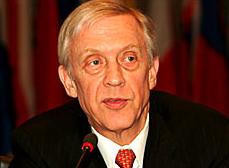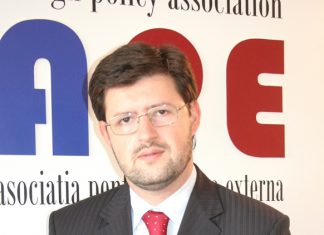Moldovan President Suspends Deal With Moscow and Tiraspol. Vladimir Socor. Eurasia Daily Monitor, 31.03.2009
Moldovan President Vladimir Voronin has pulled back at the last moment from the brink of a separate deal to put Russia in the driving seat of negotiations on Transnistria. The March 18 joint declaration by Russian President Dmitry Medvedev, Voronin, and Transnistria leader Igor Smirnov triggered that process. A meeting of Voronin and Smirnov in Tiraspol on March 25 was scheduled as next in the sequence, potentially leading to the presentation of a fait accompli by Moscow to the Western negotiators in the 5+2 format.
Moscow, Tiraspol Sidelining the West From Negotiations on Transnistria Conflict. Vladimir Socor. Eurasia Daily...
The joint declaration by Russian President Dmitry Medvedev, Moldovan President Vladimir Voronin, and Transnistria leader Igor Smirnov, signed in Moscow on March 18 (EDM, March 20, 25, 26), is serving Smirnov well as a negotiation-breaker. Citing points in that declaration, Smirnov is now calling openly for marginalizing or bypassing Western participants in the negotiating process, which Moscow and Tiraspol -or the latter fronting for the former- had already brought to a deadlock.
Moldova’s President Surrendered Long-Held Positions in Joint Declarations with Medvedev. Vladimir Socor. Eurasia Daily...
Moldovan President Vladimir Voronin's signature on the March 18 Moscow declaration, with Russian President Dmitry Medvedev and Transnistria's leader Igor Smirnov (Interfax, Russian MFA website, March 18, 19; see EDM, March 20, 25), amounts to a surrender in the final days of Voronin's presidency. This political document has solidified Russia's military presence and increased Russia's scope for influencing Moldova's policy choices through manipulation of the Transnistria conflict. These are the short-term effects and may extend beyond the short term unless a post-Voronin government disavows this move.
Russia Moving From Conflict-Freezing to Conquest-Guaranteeing in Transnistria. Vladimir Socor. Eurasia Daily Monitor, March...
Russian President Dmitry Medvedev's March 18 meeting with Moldovan President Vladimir Voronin and Transnistria leader Igor Smirnov (see EDM, March 20) was designed to mark a qualitatively new stage in the long-running negotiations on the Transnistria conflict. While continuing to block the conflict resolution negotiations, Russia is trying to move the process toward a formula to guarantee Russian control of this part of Moldova, with troops in place. Moldova's general elections, which are scheduled for April 5, give the Kremlin leverage to pressure Voronin into accepting Russia's terms.
Remarks by Dr. Dr. Hans Martin Sieg, Foreign and Security Advisor, German Bundestag, at...
Since Transnistria broke away, Moldovan governments have tried to reach a settlement, first with Tiraspol and then directly with Moscow, to find a possible path towards conflict resolution. The problem is that neither path proved to be possible.
After the war in Georgia some Western observers wondered whether Russia shouldnt now be willing to send a signal of goodwill and cooperation by resolving the Transnistrian conflict. In fact, the reaction of foreign investors alone showed how economically dependent Russia still is, and that confrontation and isolation damages the trust Russia needs to foster its own development. How isolated Russia has become was demonstrated by the fact that even its closest allies refused to follow its lead in recognizing Abkhazia and South Ossetia.
Moscow Moves To Draw Moldova, Transdniester Leaders Back Into Fold. Eugen Tomiuc. Radio Free...
The leaders of Moldova and its separatist Transdniester region have agreed to jump-start efforts to resolve their decades-long dispute through a combination of bilateral contacts and international mediation.
A Kremlin-brokered meeting in Moscow on March 18 was only the second direct contact between Moldovan President Vladimir Voronin and Transdniestrian leader Igor Smirnov in almost eight years.
Russia Tries To Lure Moldova Into New Transdniester Format
With just six weeks to go before the April 5 parliamentary elections, Russian Foreign Minister Sergei Lavrov traveled to Moldova on February 23-24, his first visit to that country since taking office in March 2004. The timing of his visit fueled speculation that its real purpose was to underscore Moscow's support for the ruling Communist Party, which is seeking a third successive term in office.
Lavrov Offers to Unfreeze Transnistria Negotiations on Eve of Moldova’s Elections. Vladimir Socor. Eurasia...
On February 24 and 25, Russian Minister of Foreign Affairs Sergei Lavrov undertook a landmark visit to Moldova, in preparation for a possible meeting among Russian President Dmitry Medvedev, Moldovan President Vladimir Voronin, and Transnistria's Moscow-installed leader Igor Smirnov next month. The ostensible goal is to jump-start a solution to the Transnistria conflict (Moldpress, Interfax, February 24-26).
Reflections on Negotiation and Mediation: Lessons from Chisinau and Tiraspol. William H. Hill. February...
In the course of my two terms as Head of the OSCE Mission in Chisinau I witnessed almost seven years of talks, contacts, walkouts, crises, recriminations, and renewals of the political settlement negotiations. Looking back and ruminating on my rather lengthy involvement in the process, I come to the following observations about both the Moldova-Transdniestria political settlement process, and negotiation and mediation in general.
The Ukrainian Gas Crisis Is Over; Moldova Now Feels The Heat. Vlad Lupan. RFERL.org
The Ukraine-Russia gas crisis has ended, and one might think everyone has returned to business as usual. But after Ukraine, the next item of business is Moldova. Russia, as both European Union and U.S. officials recall, has used gas for political leverage on previous occasions,
The European Neighbourhood Policy (ENP) in Moldova: weaknesses, strengths and future opportunities. Victor Chirila....
Summary: The ENP has given a new more dynamic impetus to Moldovas relations with the EU. In the last years, the presence and influence of the EU in Moldova has increased remarkably, the Moldova și EU political cooperation has become more active, broader and deeper,
The EU’s Sovereign Neighbours. Nicu Popescu. ECFR.eu.
The EU has an almost annual ritual of mending its often-criticised policy towards its eastern neighbours - the so-called European Neighbourhood Policy (ENP) -- through various upgrades such as the ‘New Ostpolitik', the ENP Plus, enhanced ENP, Black Sea Synergy and, most recently, the Eastern
Russia in Moldova: A Counter-Example to Ukraine and Georgia? Vladimir Socor. Eurasia Daily Monitor
Russia and Moldova are exploring a possible settlement of the Transnistria conflict on a bilateral basis, outside the international 5 + 2 format. Russia is the initiator of this approach, pulling a reluctant but still hopeful Moldova along. The Russian-desired outcome would: reunify Moldova nominally, albeit under Russian oversight; show that Russia can single-handedly settle a frozen” conflict in Europes East, marginalizing the Euro-Atlantic community in the EUs own neighborhood; and demonstrate that countries such as Moldova that do not seek to join NATO can hope for a more lenient Russian treatment, unlike Georgia and Ukraine, which Russia threatens to dismember or partition if they progress toward NATO membership.
The EU should re-engage with Moldova’s ‘frozen conflict’. Nicu Popescu. EUObserver
Recently, the EU has learned that a war over an obscure place such as South Ossetia can shatter the arrangements of post-Cold War Europe. The armed conflict between Russia and Georgia has reverberated even more shockingly across the post-Soviet space. Without stronger engagement with its neighbours, the EU might end up with a bi-polar Europe, not a "ring of friends" in its neighbourhood.
Analysis: Moldova Pushes For Transdniester Settlement. Andrei Popov. Radio Free Europe/Radio Liberty. www.rferl.org.
Representatives of all parties involved in the Transdniester settlement process gathered in Moldova for informal discussions on July 21-23. First, the 3+2 format și the Organization for Security and Cooperation in Europe (OSCE), Russia, and Ukraine, as mediators, and the European Union and the United States, as observers -- held separate meetings with Moldovan President Vladimir Voronin and Transdniester "vice president" Aleksandr Korolyov. The region's de facto president, Igor Smirnov, demonstratively chose not to attend.Then the same group participated in a meeting of the heads of joint expert groups for socioeconomic issues set up between Chisinau and Tiraspol. Finally, informal consultations were held within the complete 5+2 format, including the Moldovan and Transdniester chief negotiators focusing exclusively on proposals for advancing confidence-building measures between the two sides.
NATO Summit Sends Ambiguous Message on Russian Troops in Moldova and Georgia. Vladimir Socor....
Under Parallel Actions, NATO would accept a promise of Russian troop withdrawal from Moldova in lieu of actual withdrawal. It only speaks of withdrawal of ammunition (not troops) when possible,” without a time-table and implying through that wording that the withdrawal might be conditional (although the 1999 documents had eliminated any conditionality). The proposal allows Russia to retain peacekeeping” troops in Moldova as part of an internationalized operation; but Russia can be expected to stonewall any such internationalization, undoubtedly cite the lack of agreement on it as an excuse for keeping its troops in Moldova.
Moldovan President about Visa Regime with the EU: Between Wishful Thinking and Irresponsible Politics....
August 6, 2007 (Info-prim.md)By Andrei Popov,Executive Director, Foreign Policy Associationof Moldova (APE)At a press conference on July 25th President Vladimir Voronin spoke in ratheroptimistic terms about the possibility of liberalising visa regime with the...






